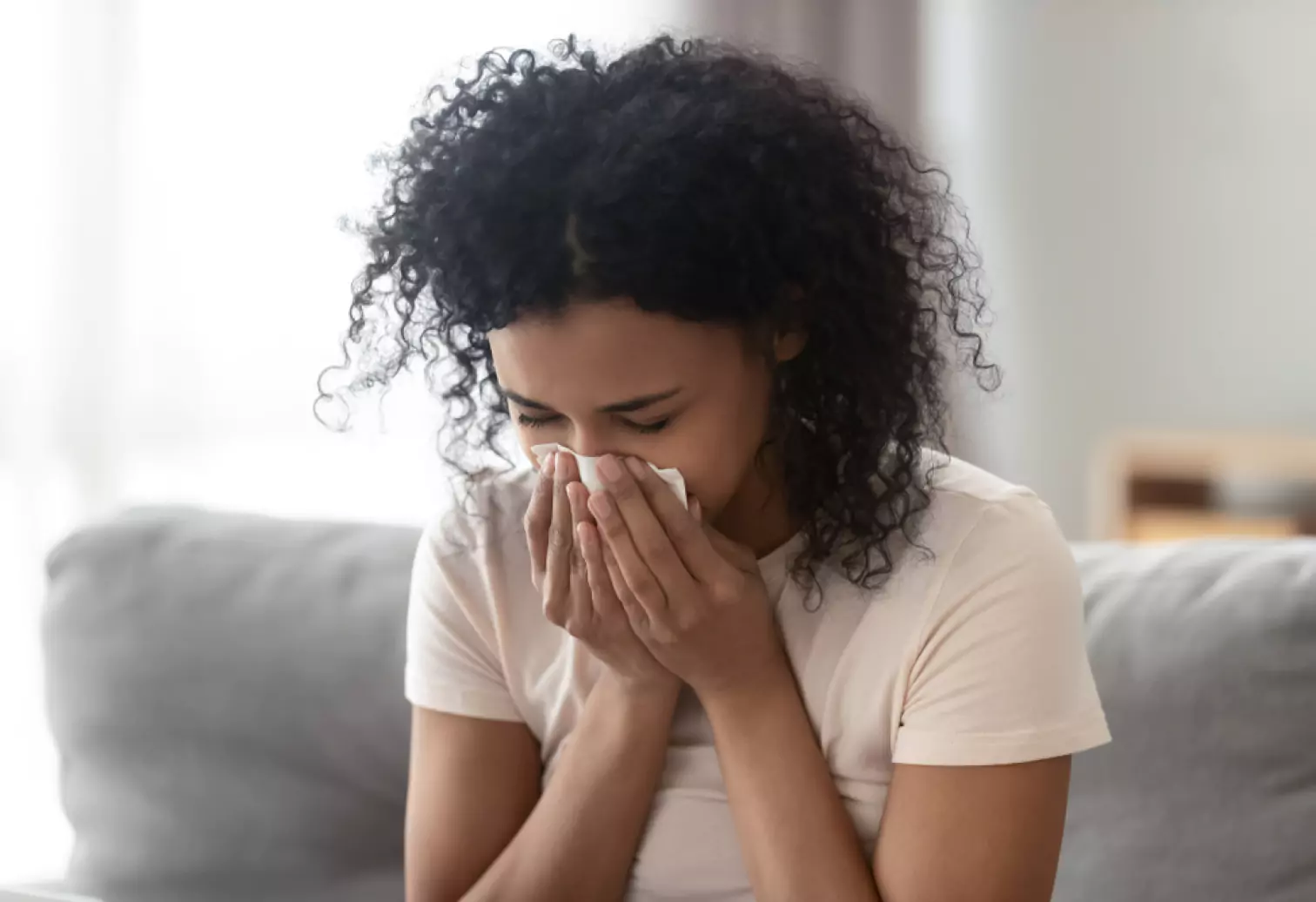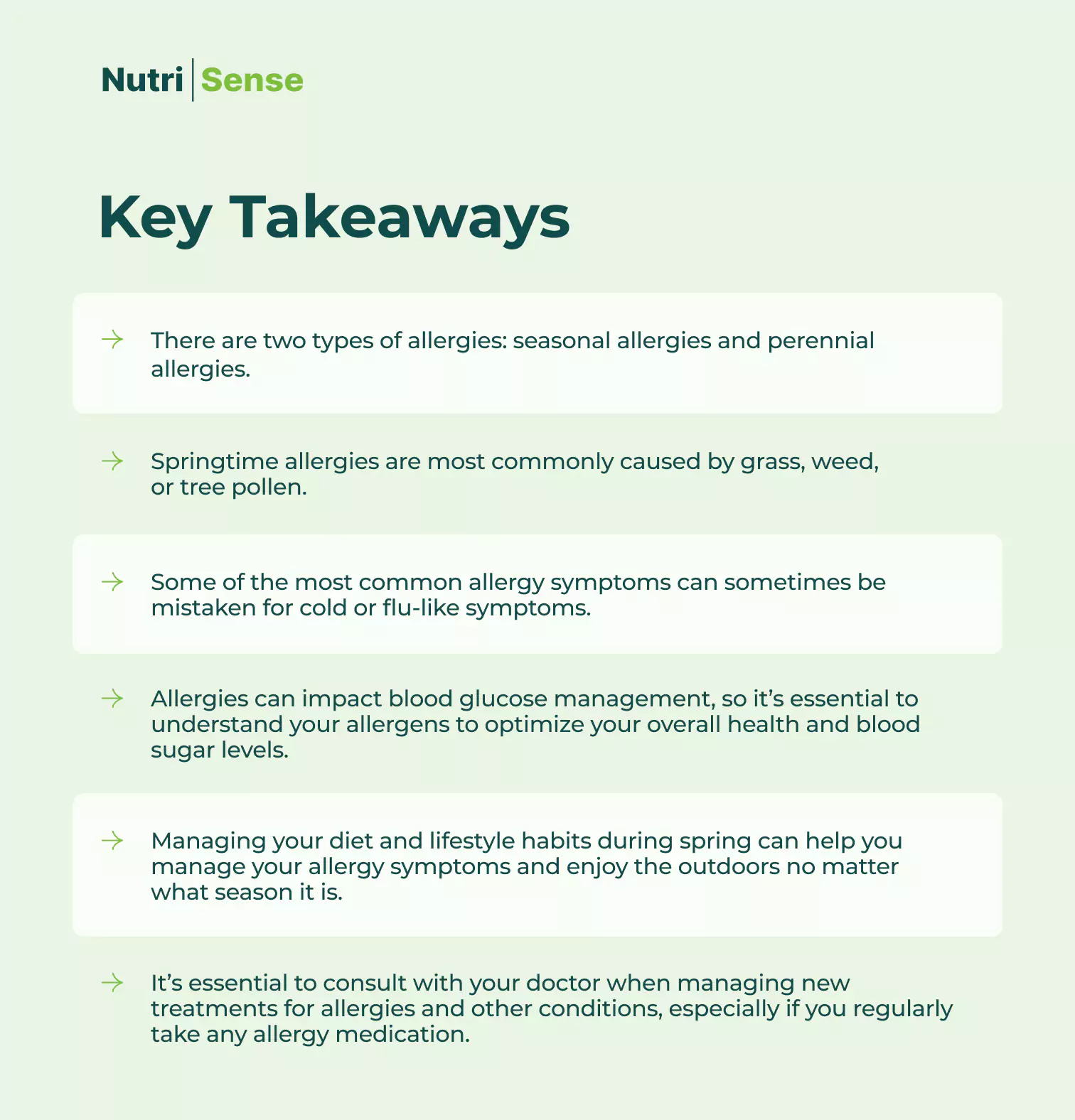Springtime Sniffles: Causes and Prevention Tips for Your Seasonal Allergies

Key Takeaways
Spring is such a wonderful time of year, isn’t it? The weather begins to warm up, days grow longer, flowers start to bloom, and the air is full of... tree pollen? With all the pleasures spring brings, for many, it also brings sniffles, stuffy noses, sneezes, and other reactions typical of seasonal allergies.
Pollen allergies may be one of the primary causes of springtime allergies. Still, several other allergens are in the air during this time of year. And they can cause a range of symptoms like sneezing, congestion, itchy noses, and watery eyes.
If you suffer from seasonal allergies, spring can be an absolute nightmare. But even though allergy sufferers can have a challenging time in spring, there are some things you can do to prevent allergies from ruining the season for you. Read on to find out more about seasonal allergies, what causes them in spring, and what, if anything, you can do about them.
What are Allergies?

Seasonal allergies, sometimes also known as hay fever or seasonal allergic rhinitis, are common problems. They’re typically caused by an immune system response to proteins in the air, most commonly grass, weed, or tree pollen.
People can be affected by various allergens, including different pollens, mold spores, and other airborne allergens, during spring, summer, autumn, or winter. So, they’re not limited to spring, but springtime often brings up more cases.
There are two broad categories of allergies: seasonal allergies and perennial allergies.
Seasonal Allergies
Seasonal allergies refer to any allergy caused by environmental factors that change with the seasons. They can be due to airborne allergens, most commonly pollen from trees, grass, and weeds. You may have seasonal allergies if you experience itchy eyes, sneezing, or a runny nose, but you're not sure what's causing the issue. While there is no cure for seasonal allergies, there are treatments and allergy medications that can help minimize your symptoms.
Perennial Allergies
You may have perennial allergies if you suffer from allergies that seem to flare up throughout the year. Perennial allergies are due to exposure to indoor and outdoor allergens like dander, dust mites, insects, and mold spores. Treatment usually involves avoiding triggers, dietary changes, air filtration, and managing symptoms with medication. Some perennial allergies can turn into chronic allergies.
What are Some Common Springtime Allergies

If you suffer from seasonal allergies, you may notice that your symptoms flare up during certain seasons and usually coincide with changes in the weather.
Although allergies are common throughout the year, when the trees begin to reproduce in the spring, they can cause more people to experience seasonal allergies. The causes of springtime allergies most often include things like pollen, grasses, and ragweed.
Some of the most common causes of seasonal allergies include:
- Pollen
- Ragweed
- Grass
- Burning bush
- Cocklebur
- Lamb’s-quarters
- Pigweed
- Tumbleweed and Russian thistle
- Sagebrush and mugwort
- Mold Spores
- Insect Stings and bites
What’s Making Your Allergies Worse in Spring

- Tree, grass, and ragweed pollen levels may rise during cool nights and warm days, so plan outdoor activities accordingly.
- After you mow your lawn, it might be good to stay inside for a while while the pollen from the grass settles down.
- Windy days cause surges in pollen and carry it everywhere. You might notice pollen build-up on your car on windy days.
- Rainfall will wash most pollen away, but pollen counts rise again after the rain (or a storm) ends.
- Molds that trigger allergies usually thrive in warm, damp environments.
- Some people are allergic to chlorine, which affects people wanting to go swimming in pools in the Spring and Summer months.

Most Common Symptoms of Spring Allergies

If you suffer from allergies, spring can be a difficult time of year. It’s likely because pollen levels are high, and there are more allergens in the air than at any other time of year.
Knowing the most common symptoms of spring allergies can help you manage your condition better and get relief from your symptoms.
If you suffer from an increase in allergy symptoms during the springtime, contact your doctor or an allergist to find out how you can best manage your condition. Alleviating your symptoms will make enjoying the warmer weather much easier!
Here are the most common symptoms of spring allergies:
Hay Fever: Hay fever is usually a catchall for seasonal allergies, but it’s also one of the symptoms of this allergy. Hay fever, also known as allergic rhinitis, is a condition that affects millions of people worldwide. It is characterized by symptoms like a runny nose, sneezing, and itchy eyes.
Itchy Eyes: Itching eyes is one of the most common symptoms of allergic reactions to seasonal allergens.
Runny Nose: Nasal congestion and a runny nose are some of the most common symptoms of allergies.
Sneezing: Many people find themselves sneezing as a result of allergies.
Coughing: Allergies can irritate the lining of your nose, which may cause a post nasal drip that travels down your throat, then causing a tickle that makes you cough.
Hives: Hives are itchy, red welts that can appear on your skin. They’re usually the result of an allergic reaction. But they can also be due to stress or have other triggers like food allergies. Hives can be short-lived or long-lasting, and they can range in size from a few millimeters to several centimeters.
Headaches: Headaches are defined as pain or discomfort in the head and can be because of various things. Some common causes include stress, tension, allergies, and even changes in the weather.
Fatigue: Fatigue is when you feel too exhausted to function normally and cannot do anything about it. It can be physical, mental, or both and can be a common side effect of allergies.
Springtime Allergies and Blood Glucose

If you suffer from allergies, you may have wondered if they could be affecting your blood glucose levels. Recent studies suggest a link between the two and that allergies can impact how your body handles glucose.
If you have diabetes or any other health condition that affects your blood glucose trends, uncontrolled pollen exposure may lead to high blood sugar levels.
If you’re struggling to keep your blood sugar in check, it may be worth talking to your doctor about whether allergies are playing a role.
Knowing more about how allergies can affect diabetes management can help you take steps to keep yourself healthy and thriving this spring.
Allergy Treatments and Preventive Measures

It’s important to talk to your doctor if you think you may have seasonal allergies. While there is no cure for seasonal allergies, many treatments can help lessen their effects.
There are several different allergy tests (like blood tests and antibodies tests) that can help determine what you're allergic to. There are also over-the-counter and prescription medications like antihistamines and decongestants that help relieve symptoms. In some cases, topical creams may help, and for severe cases, your doctor may recommend immunotherapy (allergy shots).
Springtime may be synonymous with allergies, but it doesn’t have to mean you spend the entire season coughing, sneezing, and sniffling. While allergy sufferers can't avoid allergens during this time of year, monitoring your habits and routines can make a big difference in how you feel.
Some preventative measures to protect yourself from springtime allergens include:
- Eat a diet rich in foods that have vitamins, antioxidants, anti-inflammatory, and antihistamine properties.
- Check pollen counts before spending time outdoors, and limit your time outside when the count is high.
- Immediately take a shower after spending time outside in your yard, playing sports, or hiking.
- When pollen counts are high, keep your windows and doors closed in your house and car.
- Buy good quality vents for your air conditioning system at home and in your vehicle.
- Wear a mask while mowing the lawn or gardening during allergy season.
- Keep antihistamines like Banophen, Siladryl, Unisom, Benadryl, Robitussin, or Sudafed on hand if you react to allergens. Make sure you’re aware of any possible side effects. Some allergy medication can cause drowsiness and be dangerous to take if you’re driving or operating heavy machinery.
- If you think you’re struggling with allergies and don’t know what is triggering them, speak with your doctor about taking an allergen test to determine the cause.

Find the right Nutrisense programto turn insight into progress.
Go Beyond Glucose Data with Nutrisense
Your glucose can significantly impact how your body feels and functions. That’s why stable levels are an important factor in supporting overall wellbeing. But viewing glucose isn't enough. Nutrisense, you’ll be able to learn how to use your body's data to make informed lifestyle choices that support healthy living.
One-to-one coaching
Sign up to access insurance-covered video calls to work with a glucose expert: a personal registered dietitian or certified nutritionist who will help tailor your lifestyle and diet to your goals.
Monitor and measure what matters
With the Nutrisense CGM Program, you can monitor your glucose with health tech like glucose biosensors and continuous glucose monitor (CGM)s, and analyze the trends over time with the Nutrisense App. This will help you make the most informed choices about the foods you consume and their impact on your health.
Find your best fit
Ready to take the first step? Start with our quiz to find the right Nutrisense program to help you take control.

Heather is a Registered and Licensed Dietitian Nutritionist (RDN, LDN), subject matter expert, and technical writer, with a master's degree in nutrition science from Bastyr University. She has a specialty in neuroendocrinology and has been working in the field of nutrition—including nutrition research, education, medical writing, and clinical integrative and functional nutrition—for over 15 years.




